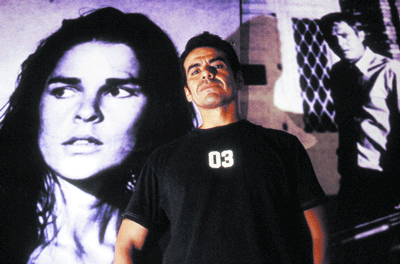Guggenheim showcases hopes and desires of 20th-century audiences
Starting the new year on a good foot, the film and media arts series “In the Air: Projections of Mexico” is storming Gotham even before the last pine needle is swept.
Expertly chosen and continuously illuminating, “In the Air,” opening this Saturday at the Guggenheim Museum, is absolutely essential viewing for film lovers, so for the next five weekends plan to climb into the Guggenheim’s groovy UFO-like auditorium, and be dazzled.
Pegged onto the museum’s current “Aztec Empire” exhibition, “In the Air” is a starkly contemporary contrast to the pre-Cortés artifacts adorning its curving walls. Last year’s Mexican cinema surveys at the Brooklyn Academy of Music and Film Forum have allowed the Guggenheim to delve beyond the obvious and feature equally vital yet underexposed currents in Mexican film and media arts. Instead of a greatest-hits countdown from Mexican cinema’s exalted Golden Age, the spotlight here is firmly on what’s called the Mexperimental cinema, the thriving, yet scarcely known work of a diverse array of avant-garde filmmakers, performance artists and cultural activists.
Taking flight from Mexican critic Carlos Monsiváis’ landmark essay “Mythologies,” series curators Maria-Christina Villaseñor of the Guggenheim and Carlos Gutiérrez of Cinema Tropical posit a number of enduring tropes of Mexican national identity—la familia, la tierra natal (native land), el gringo—as the basis for pointedly thematic programs of shorts compilations and packaged features, including works by internationally-celebrated artists Miguel Calderón, Carlos Amorales, Teresa Margolles and Ximena Cuevas. The series’ opening double bill, “La mujer” (“The Woman”) and “El macho,” perfectly showcases the curators’ subversive, unpredictable strategies.
One outstanding short film in “La mujer,” Luciana Jauffred Gorostiza’s “At That Point… Rebeca” (2003) introduces a young wife and mother of two who wakes one morning feeling unusually heavy. Outwardly unchanged, Rebeca’s weight steadily soars while her mass remains the same, like an imploding star. At first too heavy to walk, she’s propped in a bed that only collapses with her weight, and plunges Rebeca ever further down. The film’s lightly magical-realist dimension becomes apparent through the other characters’ deadpan responses. Irate neighbors demand payment for their crushed furnishings, cranes are summoned, winches snap, yet no one remarks on the fantastic nature of Rebeca’s plight.
“El macho” is the de facto homo show, with short works by queer Mexican artists Julian Hernández, Ricardo Nicolayevsky and Lourdes Portillo, plus the New York premiere of Beto Gómez’s feature “Pink Punch,” a deliriously straight-faced satire of 1970s narcotraficante melodramas that roasts the entire sub- genre of macho stereotypes over the open flame of homoerotic desire. Germán (José Yenque), the hunky, tormented scion of a ruthless criminal dynasty—governed by the acid tongue of his badly coiffed mother, La Güera (Isela Vega)—is on the down low, married to an obtuse, resentful wife, but lusting for the rough-diamond boxing hopeful Jimmy (Rodrigo Oviedo). Brilliantly sustained and outrageously entertaining, “Pink Punch” is the series’ most unexpected discovery.
While the overwhelming emphasis is on the new, “In the Air” covers its historical bases while tweaking the canon. In addition to newly restored black-and-white 35mm prints of two rarities by Fernando de Fuentes, Mexican cinema’s foremost pre-Golden Age auteur, the series drops the mondo cherry bomb “El Santo Versus The Martian Invasion” (1967). This prime entry in the eternally popular serial finds El Santo, the beefy, masked, leotard-clad wrestler, locked in battle with Martian mannequins just in from the swinging London of Antonioni’s “Blow-Up.”
Featured in the program “La corupción,” (“Corruption”) Fernando de Fuentes’s “Prisoner Number Thirteen” (1933), first in the director’s classic trilogy on the Mexican Revolution, is a blistering morality play about militarism. The alcoholic colonel Carrasco, abandoned years before by his long-suffering wife and young son, imprisons a band of doomed revolutionaries, then cops a bribe to trade one of them for another inmate—his now-grown son Juan. Made monstrous by his ingrained authoritarianism, the colonel sends his son before the firing squad, but even more disturbing than this shattering climax is the patently incredible, censor-imposed happy ending.
There’s plenty more—a documentary portrait of legendary actress María Félix, who died in 2002; a program of videos by indigenous filmmakers; a colonialism-in-reverse musical with a singing charro, or cowboy, conquering Seville, Spain. So take advantage of this chance to be enriched by the rarely seen Mexican treasures in every program of this series.
gaycitynews.com



































